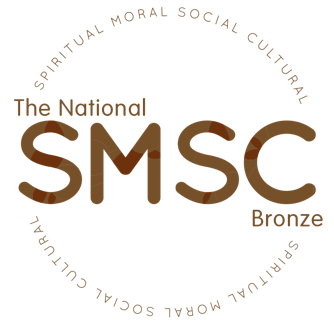British Values and SMSC

British Values, Spiritual, Moral, Social & Cultural Education
At Pennine View School we ensure that through our school vision and values, expectations and curriculum we promote tolerance and respect for all cultures, faiths and religions. We promote ‘British Values’ through our spiritual, moral, social and cultural education which permeates through the school’s curriculum. We recognise that such development is most successful when those values and attitudes are promoted by all the staff and provide a model of behaviour for our pupils
Mutual Respect
At Pennine View School we value everyone. Our school ethos, school rules and behaviour policy are based around the core value of respect. We teach our pupils to respect the many diverse faiths and beliefs. We look after each other and the environment around us. We respect others opinions and beliefs. We promote each pupil’s inclusion in activities, settings and locations that are appropriate to them individually to meet their needs. Within school, pupils work with a range of people and interactions with others are always positively promoted and personalised for each individual.
Democracy
The ability to understand and communicate are the most important areas of learning. We ensure that pupils are given a ‘voice’ to communicate. Pupils opinions and views are actively sought through careful questioning and presentation of thought provoking materials. Our Pupil Parliament is nominated through an election and their work supports the Schools Improvement Planning process.
Rule of Law
We involve pupils in setting expectations of behaviour; helping pupils to make decisions and choices that are acceptable to the school community and society at large. Pupils are helped to learn to manage their behaviour and take responsibility for their actions. Rewards are in the form of Dojo points and Star of the Week certificates through our weekly whole school assembly. Visits from authorities such as the police, fire service are part of our curriculum and help reinforce the rule of law. Staff are committed to providing a consistent and predictable environment within the school and beyond. We help pupils to understand the connection between actions and consequences. This type of environment enables pupils to feel safe and secure; this in turn, promotes the optimum conditions for learning to take place.
Tolerance of Different Faiths and Beliefs
We are part of a school and local community where each person is respected and valued equally. Cultural appreciation and development forms part of our curriculum. We place great emphasis on providing encounters and participation in events and celebrations to broaden all pupils’ experiences and awareness of others. Pupils are encouraged to experience British Culture through our curriculum themes. As a school, we take part in sporting activities which helps to instil ‘fair play’ and engender a ’team spirit’. If staff are concerned about a pupil our accepted practice links to the Safeguarding Policy which entrusts a duty of care to all staff to actively protect and promote the welfare of children.
Individual Liberty
Pupils are encouraged to become good and valued citizens. We do this by supporting each pupil to become as independent as possible. Pupils are actively encouraged to make choices and express themselves through the provision of a safe environment and planned curriculum. Pupils are encouraged to know, understand and exercise their rights and personal freedoms and are advised how to exercise these safely. Pupils are given the freedom to make choices e.g. lunchtime clubs, food at dinnertimes, vocational and enterprise learning lessons. Some pupils take responsibility for particular roles such as lunchtime monitors and to understand that with certain rights comes a level of responsibility.
Promoting Spiritual, Moral, Social & Cultural Education
We identify opportunities for the development of Spiritual, Moral, Social and Cultural Education throughout the curriculum and it is often implicit in teaching strategies and approaches, relationships and classroom ethos.
Spiritual
Explore beliefs and experience; respect faiths, feelings and values; enjoy learning about oneself, others and the surrounding world; use imagination and creativity.
Moral
Recognise right and wrong; respect the law; understand consequences; investigate moral and ethical issues; offer reasoned views.
Social
Use a range of social skills; participate in the local community; appreciate diverse viewpoints; participate, volunteer and cooperate; resolve conflict; engage with the ‘British values’ of democracy, the rule of law, liberty, respect and tolerance.
Cultural
Appreciate cultural influences; appreciate the role of Britain’s parliamentary system; participate in culture opportunities; understand, accept, respect and celebrate diversity.
Examples of activities to develop knowledge, skills and understanding of SMSC and British Values include:
- Pupil Parliament meetings
- Celebration of Easter, Eid, Christmas,
- Visits to areas within the local community including the Library, shops and cafes
- Class rules
- Taught Curriculum
- Personal, Social Education including 1:1 PSE lessons
- Religious Education delivered weekly
- Assembly focus upon each aspect of SMSC
- Schools approach to managing behaviour

